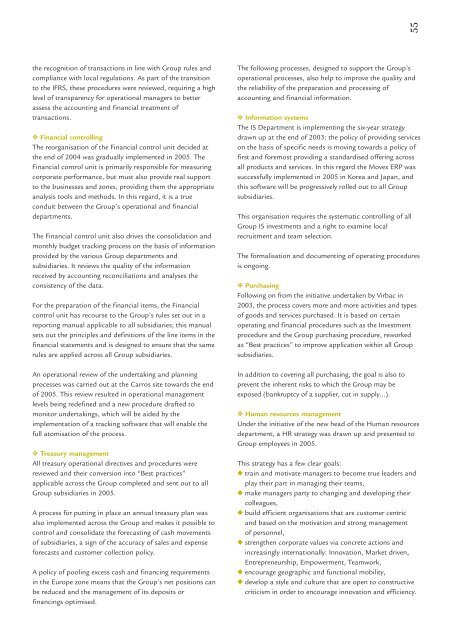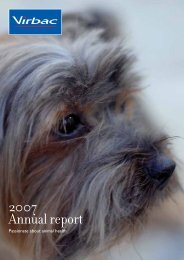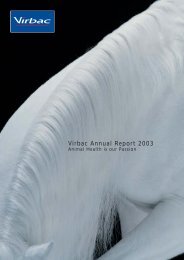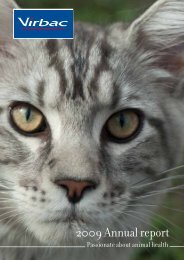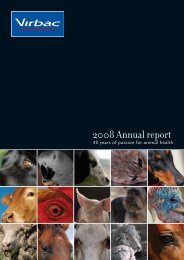2005 Annual report - Virbac
2005 Annual report - Virbac
2005 Annual report - Virbac
You also want an ePaper? Increase the reach of your titles
YUMPU automatically turns print PDFs into web optimized ePapers that Google loves.
55<br />
the recognition of transactions in line with Group rules and<br />
compliance with local regulations. As part of the transition<br />
to the IFRS, these procedures were reviewed, requiring a high<br />
level of transparency for operational managers to better<br />
assess the accounting and financial treatment of<br />
transactions.<br />
❖ Financial controlling<br />
The reorganisation of the Financial control unit decided at<br />
the end of 2004 was gradually implemented in <strong>2005</strong>. The<br />
Financial control unit is primarily responsible for measuring<br />
corporate performance, but must also provide real support<br />
to the businesses and zones, providing them the appropriate<br />
analysis tools and methods. In this regard, it is a true<br />
conduit between the Group’s operational and financial<br />
departments.<br />
The Financial control unit also drives the consolidation and<br />
monthly budget tracking process on the basis of information<br />
provided by the various Group departments and<br />
subsidiaries. It reviews the quality of the information<br />
received by accounting reconciliations and analyses the<br />
consistency of the data.<br />
For the preparation of the financial items, the Financial<br />
control unit has recourse to the Group’s rules set out in a<br />
<strong>report</strong>ing manual applicable to all subsidiaries; this manual<br />
sets out the principles and definitions of the line items in the<br />
financial statements and is designed to ensure that the same<br />
rules are applied across all Group subsidiaries.<br />
An operational review of the undertaking and planning<br />
processes was carried out at the Carros site towards the end<br />
of <strong>2005</strong>. This review resulted in operational management<br />
levels being redefined and a new procedure drafted to<br />
monitor undertakings, which will be aided by the<br />
implementation of a tracking software that will enable the<br />
full atomisation of the process.<br />
❖ Treasury management<br />
All treasury operational directives and procedures were<br />
reviewed and their conversion into “Best practices”<br />
applicable across the Group completed and sent out to all<br />
Group subsidiaries in <strong>2005</strong>.<br />
A process for putting in place an annual treasury plan was<br />
also implemented across the Group and makes it possible to<br />
control and consolidate the forecasting of cash movements<br />
of subsidiaries, a sign of the accuracy of sales and expense<br />
forecasts and customer collection policy.<br />
A policy of pooling excess cash and financing requirements<br />
in the Europe zone means that the Group’s net positions can<br />
be reduced and the management of its deposits or<br />
financings optimised.<br />
The following processes, designed to support the Group’s<br />
operational processes, also help to improve the quality and<br />
the reliability of the preparation and processing of<br />
accounting and financial information.<br />
❖ Information systems<br />
The IS Department is implementing the six-year strategy<br />
drawn up at the end of 2003: the policy of providing services<br />
on the basis of specific needs is moving towards a policy of<br />
first and foremost providing a standardised offering across<br />
all products and services. In this regard the Movex ERP was<br />
successfully implemented in <strong>2005</strong> in Korea and Japan, and<br />
this software will be progressively rolled out to all Group<br />
subsidiaries.<br />
This organisation requires the systematic controlling of all<br />
Group IS investments and a right to examine local<br />
recruitment and team selection.<br />
The formalisation and documenting of operating procedures<br />
is ongoing.<br />
❖ Purchasing<br />
Following on from the initiative undertaken by <strong>Virbac</strong> in<br />
2003, the process covers more and more activities and types<br />
of goods and services purchased. It is based on certain<br />
operating and financial procedures such as the Investment<br />
procedure and the Group purchasing procedure, reworked<br />
as “Best practices” to improve application within all Group<br />
subsidiaries.<br />
In addition to covering all purchasing, the goal is also to<br />
prevent the inherent risks to which the Group may be<br />
exposed (bankruptcy of a supplier, cut in supply...).<br />
❖ Human resources management<br />
Under the initiative of the new head of the Human resources<br />
department, a HR strategy was drawn up and presented to<br />
Group employees in <strong>2005</strong>.<br />
This strategy has a few clear goals:<br />
◆ train and motivate managers to become true leaders and<br />
play their part in managing their teams,<br />
◆ make managers party to changing and developing their<br />
colleagues,<br />
◆ build efficient organisations that are customer centric<br />
and based on the motivation and strong management<br />
of personnel,<br />
◆ strengthen corporate values via concrete actions and<br />
increasingly internationally: Innovation, Market driven,<br />
Entrepreneurship, Empowerment, Teamwork,<br />
◆ encourage geographic and functional mobility,<br />
◆ develop a style and culture that are open to constructive<br />
criticism in order to encourage innovation and efficiency.


